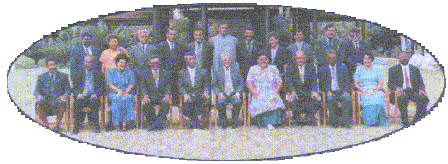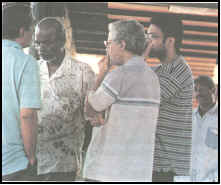|
Chronological
history |
|
Bavadra's legacy |
|
Party launch 1985 |
|
|
|
|
|
July 6, 1985 |
The Fiji Labour Party was
launched under the aegis of the Fiji Trades Union Congress to fight the
Alliance Party's growing insensitivity towards the plight of the workers
and the poor. The inaugural meeting was held at Fijian Teacher Association
(FTA) hall. It attended by FTUC executives, politicians, professionals and
a record number of people. Some of prominent people in the inaugural
meeting were, Dr. Timoci Bavadra, Mr. Navin Maharaj, Mr. Mahendra Pal
Chaudhry, Mr. Jai Ram Reddy, Mr. Krishna Datt, Mrs Jokapeci Koroi, Dr.
Tupeni Baba etc.
|
|
1985 |
Municipal Elections
The Suva City Council elections posed Fiji Labour
Party's first test. The party contested all the wards and gave Suva its
first Labour Party Mayor, Mr. Bob Kumar. All together FLP won eight wards.
The Labasa, Nadi Ba Town Council Elections were also
contested with Labour winning five, one and three wards respectively. It
also won the well contested Lautoka Simla Ward by-election by a clear
margin.
|
|
1986 |
Mr. Mahendra Pal Chaudhry
narrowly misses the North-Central Indian Constituency by-election by a
meagre margin of 204 votes indicating the growing support and strength
gained by the fledgling Fiji Labour Party in just a short period of time. |
|
|
Uday Singh, Alliance
Mahendra Chaudhry, Fiji Labour Party
James Shankar Singh, National Federation Party |
885
7644
5003 |
|
April 1987 |
The Fiji Labour Party in coalition with National
Federation Party won the General elections with an overwhelming majority.
This was the first time in history of Fiji that a party apart from the
ruling alliance had won the general elections so convincingly. Dr. Timoci
Bavadra became Fiji's second Prime Minister.
|
|
April 13, 1987 |
The Fiji Labour Party President
and Leader, Dr. Timoci Bavadra, sworn in as Fiji's second Prime Minister
and Minister for Public Service and Fijian Affairs.
|
|
April 1987 |
The swearing in of the Fiji
Labour Party and NFP coalition Government Ministers.
Some prominent names were Mr. Jai Ram Reddy - Attorney
General, The Finance Minister was Mr. Mahendra Chaudhry, Dr. Tupeni Baba
was the Education Minister, Mr. Krishna Datt was the Foreign Affairs
Minister etc. There was a real optimism in the country and the majority of
people were looking forward to the new Government.
|
|
May 14, 1987 |
The coalition government is
deposed by a military coup, led by Major General Sitiveni Rabuka and the
Cabinet and members of the government are held hostage for 7 days. The
country is thrown into chaos and there is panic and fear among the
citizens. Major General, Sitiveni Rabuka claims that he had carried the
coup to safeguard Fijian paramountcy. There is widespread military torture
on the general public, especially the Indo-Fijians as the military tries
to impose its authority on the country. Several worshipping places are
burnt by the Nationalistic elements in the community and Indo-Fijian
religious functions are stopped by the military. The Sunday Ban follows as
all businesses, sports and other activities are brought to a halt by the
demands of the Methodist church leaders.
|
|
June 1987 |
A delegation led by Fiji Labour
Party Leader, Dr. Timoci Bavadra for the restoration of democracy in Fiji
begins and discussions are held with Sir William Heseltine, the Queen's
Private Secretary, the commonwealth Secretary General, Sir Shirdath
Ramphal. The visit is followed by meetings with the heads of governments,
trade unions and political leaders from Australia, New Zealand, India,
United States, Canada, Papua New Guinea, and New Caledonia.
|
|
September 23, 1987 |
The Fiji Labour Party Leader, Dr.
Timoci Bavadra leads a delegation of his deposed colleagues in discussions
with the defeated Alliance party headed by Ratu Sir Kamisese Mara. A
political solution is found in the Deuba Accord. Signed on September 23,
1987, it is based on an agreement between the deposed government and the
Alliance to share power.
|
|
September 25, 1987 |
A second military coup takes
place led by Major General Sitiveni Rabuka. The Labour Party Leader, Dr.
Bavadra along with many of his colleagues and sympathisers are again
arrested and held in detention at the Naboro Prison about 30 kilometres
from Suva. This time the military abrogates the 1970 Constitution and
imposes an interim government in Fiji led by the Alliance leader, Rt. Sir
Kamisese Mara and members of his previous government.
|
|
May 14, 1988 |
Fiji Labour Party activist for
democracy arrested at Sukuna Park at the first anniversary of the coup,
among them Dr. Atu Bain and Dr. Vijay Naidu.
|
|
September 1987 -1989 |
The fight for restoration of
democracy continues with Fiji Labour Party leading the way. May 14th is
declared a black day in the history of Fiji and black bands are worn in
remembrance and protest against the dreadful day. Various meetings are
held with institutions and leaders of others countries as well as the
Commonwealth. The Interim administrative is in the process of drafting a
new racially biased and overtly discriminatory constitution.
|
|
November 3, 1989 |
The leader of Fiji Labour Party,
Dr. Timoci Bavadra who had been taken illand expires. Record 60,000 people
attended the great leaders funeral five days later with schools being
closed for the day in his respect.
|
|
1990 - 1992 |
Fiji Labour Party faces tough
times during the years but still manages to fight for restoration of
democracy and leads a very meaningful protest against the implementation
of the racially biased and discriminatory 1990 constitution. Protests
against the 1990 Constitution leads to the burning of the Constitution
during Diwali by some members of the Party.
|
|
1992 |
Fiji Labour Party, despite
struggling manages to win 13 seats in the Lower House of Representatives
and together with other parties forms a very formidable Opposition. Mr.
Lekh Ram Vayeshnoi is the youngest MP in the House of Representatives. The
Fiji Labour Party enters into a deal with SVT to support Sitiveni Rabuka
for Prime Ministership in return for an immediate review of the racially
discriminatory 1990 Constitution, Agricultural Landlords and Tenants Act
(ALTA), Value Added Tax (VAT) and the labour reforms
|
|
June 1993 |
The failure of the Prime
Minister, Sitiveni Rabuka to honour his part of the post-election accord
and his rather offensive and contradictory statements about his agreement
and intentions prompts the Labour Leader, Mr. Mahendra Pal Chaudhry to
lead a workout of the parliament, withdrawing its support for the
government. The Fiji Labour Party Secretary General, Navin Maharaj
resigned as the Deputy Speaker. The Labour walkout forces Rabuka to act
and within a week of the walkout, an extended Cabinet sub-committee was
appointed to review the racially discriminatory 1990 constitution.
|
|
September 1993 |
The Cabinet Sub-Committee draws
up the terms of reference for a commission to review the constitution. The
fact the terms of reference was not adequately protecting the Indo-Fijian
interests prompted Fiji Labour Party to re-enter the Parliament to enforce
changes to the terms of reference. Fiji Labour Party also wanted the
commissions report subjected to scrutiny by a parliament select committee,
a very important aspect not contained in the Rabuka/Reddy terms if
reference.
|
|
October 1993 |
Dr. Kanhaiya Simadri Naidu, a
dedicated and active party stalwart passed away.
|
|
1993 |
Fiji Labour party works closely
with government backbenchers led by Josevata Kamikamica and David
Pickering (Member of All National Congress in opposition) to defeat the
1994 Budget. The defeat of the budget brings down the Rabuka government,
but Fiji Labour Party efforts to appoint a caretaker Prime Minister to
replace Rabuka was thwarted when National Federation Party (NFP) and its
Leader gave his support to Rabuka to remain as Prime Minister.
|
|
April 1994 |
Snap elections held and NFP
played the race card blaming Fiji Labour Party for its post-election
agreement pact with Rabuka. NFP waged a bitter communal campaign
denouncing the Fiji Labour Party for backing the coup leader. Despite
that, the Labour Party wins 7 seats and remains in the Opposition. More
importantly, though FLP had only 7 seats, its support in the grassroots
level remained intact with Labour amassing 47% of the total Indian votes
cast.
|
|
June 29, 1994 |
Founder member and long time
party stalwart and supporter, Mr. Shiromani Madhwan succumbed to failing
health, which kept him in hospital both here, and abroad for many weeks
before his death.
|
|
1994 |
Labour Party's efforts a Joint
Parliamentary Select Committee (JPSC) to review the constitution is
rewarded and Labour Party MP's, Mahendra Chaudhry, Krishna Datt and
Hardayal Singh are appointed to the Constitution Review Parliamentary
Select Committee.
|
|
August 1994 |
Labasa By-election held after the
untimely death of NFP Parliamentarian, Shree Ramlu. FLP and NFP agreed on
a compromised candidate Munsami Chinnakannu, as grassroots Indian opinion
was strongly in favour of a unified approach to issues confronting the
community. Elected unopposed.
|
|
May 8, 1995 |
The party was shocked by the
untimely death of Hardayal Singh in a car accident just two weeks before
the Delegates Conference. Hardayal had won his parliamentary seat in the
1994 general election, defeating NFP President, Balwant Singh Rakka.
|
|
1997 |
The new Constitution was adopted
after extensive consultation with all parties. The 1997 Constitution was
passed by both Upper and Lower Houses without much opposition.
|
|
1998 |
Fiji Labour Party entered into a
coalition with Fijian Association Party headed by Adi Kuini Speed, and
Party of National Unity, headed by Tui Ba, Ratu Sairusi Nagagavoka, to
fight the upcoming 1999 general elections.
|
|
May 1999 |
Fiji Labour Party after running
an extensive election campaign to address the plight the poor and
disadvantaged, wins the majority of 37 seats and together with its
coalition partners win 52 seats out of possible 71 seats.
|
|
May 1999 |
Fiji Labour Leader and for the
first time in Fiji's democratic history, a Fiji-born Indian, Mr. Mahendra
Pal Chaudhry is sworn in as the Prime Minister of Republic of the Fiji
Islands.
|
|
May 1999 |
Peoples Coalition Government
Cabinet sworn in with the Dr. Tupeni Baba and Adi Kuini Speed as the
deputy Prime Ministers. |
|

Coalition Government Cabinet 1999
|
|
May 1999 - May 2000 |
The Peoples Coalition Government
went to work in trying to fulfil its pledge to the poor and disadvantaged.
It managed to get the previously staggering economy to its feet and was
placed well to lead the republic of Fiji Islands into the new Millennium.
(Please refer Peoples Coalition Government Achievements)
|
|
May 19th 2000 |
A band of terrorists led by
failed businessman George Speight storms the parliament with the help of
Counter Revolutionary Warfare Unit soldiers and takes the government and
its members hostage. The Prime Mininster, Mr. Mahendra Chaudhry and his
son Rajendra Chaudhry together with his Cabinet Ministers and backbenchers
of People's Coalition Government were held for 56 days at gunpoint. There
was widespread violence and looting in the City of Suva. The City was in
ruins with the aftermath of burning and looting by the Indigenous marchers
and the the people were thrown into chaos and panic and were in fear for
their lives at the sight of this rampage led by some prominent indigenous
Fijian leaders. The whole country is taken into grief as the reality of
situation settles and the country is once again thrown into the turmoil it
came out from, only this time more serious and heinous. |
|

Hostage Labour Party parliamentarians May 2000
|
|
June 2000 |
Fiji's first ever-political
refugee camp emerged amidst continued terrorism by the Muaniweni and
Dawasamu landowners. The police and the army are unable to contain the
continued terrorist acts and the tenant community flee leaving everything
behind.
|
|
July 2000 |
The Prime Minister, Mr. Mahendra
Chaudhry and members of his Peoples Coalition Government hostages are
released.
|
|
March 2001 |
Landmark ruling in the Chandrika
Prasad appeal case whereby Fiji Court of Appeal judgement ruled in favour
and upheld the 1997 Constitution.
|
|
August 2001 |
The general elections saw the
return of the majority of the Fiji Labour Party members back in the House
of Representatives. However, a new Party led by Laisenia Qarase in
coalition with nationalistic Matanitu Vanua forms the government.
|
|
September 2001 |
SDL government fails to uphold
the Constitution and the spirit of reconciliation by omitting Fiji Labour
Party from the Cabinet. Fiji Labour Party mounts a challenge in the Court
against its omission from the Cabinet.
|
|
2001 |
Opposition Leader rejects four
nominees from the eight submitted by the Fiji Labour Party and appoints
his four. Fiji Labour Party again challenges the decision in Court.
|
|
October 2001 |
Fiji Labour Party Nadi Open
candidate, Mr. Krishna Prasad, mounts a legal challenge against the
Opposition Leader, Mr. Prem Singh, claiming that Mr. Prasad should be the
legal representative of that Constituency. Similar cases are filed in Suva
by FLP candidates, Mrs Lavenia Padarath, Joeli Kalou and John Ali.
Judgement pending.
|
|
February 2002 |
Krishna Prasad of Labour Party
wins the case and is declared the elected candidate of Nadi Open
Constituency. Opposition Leader appeals for a stay order against the
decision even though there is no jurisdiction on the decision of the High
Court. Appeal pending.
|
|
March 2002 |
The Appeals Court rules that the
Opposition Leaders nomination is unconstitutional and the President should
call fresh nomination.
|
|
April 2002 |
Chief Justice grants the
Opposition Leader an extension on the stay order amidst growing
controversy.
|
|
April 2002 |
The High rules in favour of Fiji
Labour Party stating that FLP should be included in the Cabinet. SDL
contemplates appealing.
|
|
April 2002 |
Seven Fiji Labour Party Senators
sworn in the Upper House of Representatives.
|
|
|
|
|
|
